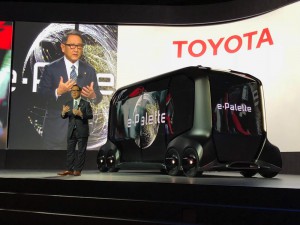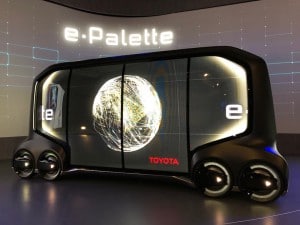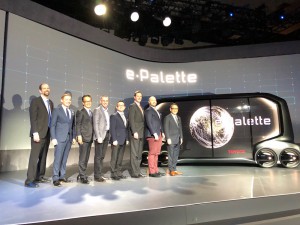
Think of the concept vehicle Toyota unveiled at CES Monday as something of a blank canvas. The e-Palette can serve as anything from a driverless ride-sharing vehicle to an automated delivery van – even a mobile store where commuters can shop on their way to work.
The battery-drive prototype will make the transition from concept to reality two years from now when Toyota puts several versions of the e-Palette into service during the 2020 Tokyo Olympics. And the giant automaker has already signed up several e-commerce partners, including Amazon, Pizza Hut and the ride-sharing service Uber.

Think of e-Palette as a “multi-purpose moving space,” said Akio Toyoda, the CEO of Toyota Motor Corp. and grandson of its founder. “Every e-Palette can be reconfigured for different purposes within a single day.”
The auto industry is in a race to bring autonomous and fully driverless vehicles to market. Proponents contend the technology will reduce congestion and improve highway safety, among other things. But there’s also growing interest in finding e-commerce opportunities.
(CES focus shifts from smartphones, smart TVs to smart cars. Click Here for the story.)

At a separate presentation at CES – formerly known as the Consumer Electronics Show – NVIDIA CEO Benson Huang said that by removing the driver from the vehicle ride-sharing services will be able to provide mobility at a cost less than that of owning and operating a personal vehicle.
Indeed, ride-sharing services like Uber are among those driving the development of self-driving vehicles, said Gil Pratt, the head of the Toyota Research Institute, and the overseer of the automaker’s autonomous program.
But there are other commercial opportunities, Toyota is betting. Among other things, it is exploring ways to use a vehicle like the e-Palette as an unmanned pizza delivery vehicle, or to deliver products for online services like Amazon.
Even conventional retailers could use a driverless vehicle. “Today,” said Toyota CEO Toyoda, “you have to travel to the store. In the future, the store will come to you.”
The carmaker hopes to demonstrate the capabilities of the e-Palette concept during the 2020 Olympics. As a key sponsor Toyota is planning to show off not only its conventional vehicles but futuristic concepts that include a drone-like flying car.

Toyota is by no means the only automaker exploring such concepts. Where CES has traditionally focused on technologies like smartphones, TVs and game consoles, automakers, auto suppliers and new mobility entrants have staked a major presence in Las Vegas this year.
(Click Here for Toyota’s plans to take to the air at the 2020 Tokyo Olympics.)
Among those looking to stake a presence are tech firms like NVIDIA and Google spinoff Waymo. Apple is widely rumored to be working up its own autonomous vehicle program. And though it has yet to be confirmed, CEO Tim Cook has done much to encourage that speculation in recent months.
Toyota’s CEO said he doesn’t downplay the potential threat posed by such newcomers. “We didn’t start making cars either,” said Toyoda, noting that the largest of Japan’s automakers started out in the textile industry.
The Japanese automaker was actually slow to make a push into autonomous technology, only launching its research institute a couple years ago.
Waymo is already field testing a fleet of autonomous ride-sharing vehicles in the Phoenix area and will start adding fully driverless models this year. General Motors plans to start producing fully driverless ride-sharing vehicles by 2019 and Ford has set a 2022 target date for debuting similar vehicles.
“I’m less concerned about getting there first than I am about getting it right,” Toyoda said.
(To see more about the new mobility company Toyota founded in Tokyo, Click Here.)
The Japanese carmaker didn’t put a hard date on when it might put a vehicle like e-Palette into mass production. TRI chief Pratt did note there would likely be several different versions when it does come to market, small, medium and large.







